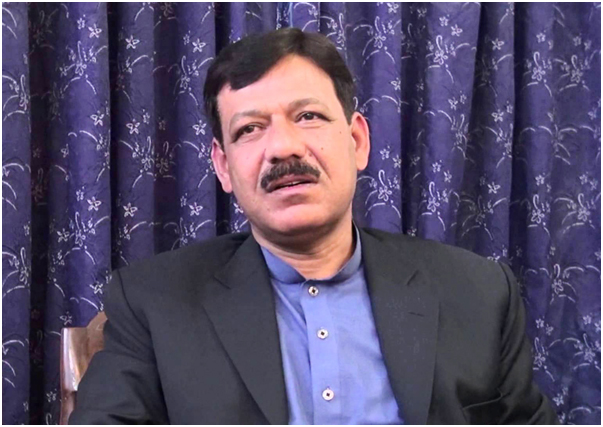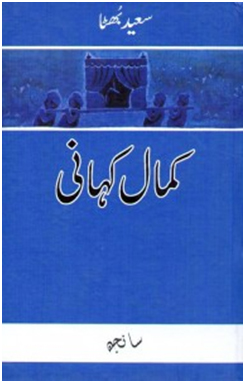|
A teller of storytelling
M. Salim-ur-rahman
Saeed Bhutta has single handedly salvaged something of remarkable cultural and literary value and it is a work we should be thankful for

It would hardly be an exaggeration to say that the world has changed more during the last fifty years than it did in the preceding five millenniums. But changes, so swift and unforeseen, have catapulted the social setups everywhere into situations which demand sacrifices all the time, wiping out the old certainties and ushering in nightmarish uncertainties.
An outcome of all this unseemly haste, or call it brakeless progress, has been the sudden extinction of some of the oldest professions which played a pivotal role in the rural domain. Gone are the weavers, the potters, the shoemakers, the well-sinkers and the trackers and the terminology peculiar to these professions now approaches a vanishing horizon.
These were essentially utilitarian crafts rendered obsolete by technical innovations. But there was another craft, with an aesthetic weightage, which has also fallen by the wayside. Storytelling was a peculiar art, germane to the rural ambience, no longer heeded as there are plenty of diversions now available. The advent, first of theatre and then of film, made it something of a superfluity and the intrusion of the internet and home computer delivered a knockout blow.
The storyteller was not merely an entertainer. He was, in a sense, a folklorist, a genealogist, an encyclopedia of the place he dwelt in, a possessor of rural wisdom and a sort of historian who did not rely on bookish histories. Literally an indispensable person in days gone by, now, all of a sudden, shorn of worth. But his likely disappearance from the stage means the loss of a priceless ethos.
Saeed Bhutta is a dedicated scholar of Punjabi Literature and Culture. Almost twenty five years ago, when he met Kamal Deen, one of the most prominent storytellers around, he realised that once the old man passes away, his repertoire of stories which he recounted so skilfully will be lost forever. Kamal Deen’s sons were no longer interested in continuing their father’s tradition. The need of the hour was to save whatever one could.
Altogether Bhutta recorded twenty two stories in Kamal Deen’s voice and published fourteen of them in a book entitled Kamal Kahani. He was sensible enough not to rewrite or edit these stories. They appear exactly as told by Kamal Deen. The title, a play on words, was well-chosen also, as it means

“Stories by Kamal” as well as “Remarkable stories”.
Although some of the stories may be hundreds of years old, having passed on by one generation of narrators to another, there is a strange fragility about them. They are fragile in the sense that if you temper with the narrative flow or the befitting diction, something is utterly and irrevocably lost. It is artistry of a different nature, very protective of its lineaments and resentful of any intrusion. By publishing them just as they were told, Bhutta has allowed their intrinsic charm to remain intact.
Once he got hooked on the project, he never stopped. He kept on recording as many stories as he could and by now has published four collections of folk narratives. There may be more stories in the pipeline still. It is a work we should be thankful for because Saeed Bhutta has singlehandedly salvaged something of remarkable cultural and literary value.
These stories can be split, for the sake of convenience, into roughly three categories, that is, quasi-historical, legendary and folkloric. History, as we know is an incoherence of events reduced to a linear cause-and-effect narrative by the historians, often calling for the suspension of disbelief by the general reader. However, Kamal Deen and other storytellers, who exemplify the same no holds barred type of narrative, turn history into a playground where human acts and emotions follow no particular rules. They have no intention of writing history as such but make use of historical persons as identifiable props to create dramatic moments. Therefore when we see Aristotle accompanying Alexander during his long campaign in Asia, it is possible that the story-teller wishes to underline the thought that courage without wisdom is dangerously close to foolhardiness. As a matter of fact, Aristotle acted as a tutor to Alexander for hardly a couple of years and never left Greece. But the storyteller, with his generosity of imagination, can make anything happen.
Similarly stories which relate to Raja Karnal or Emperor Akbar or Mulla Dopiaza are legends refashioned to please the audience. “Mulla Dopiaza” and “Gamen Sachyar” represent storytelling at its best. “Sakhi Saudagar” and “Char Siyane” are folktales. Many of these tales are like medieval chant-fable in the sense that the prose is interspersed with verse. Perhaps in ancient times there may have been two storytellers working in unison, one narrating the story in prose with dramatic gestures, the other singing out the verses, playing a musical instrument.
You may like to read: A chronicler of people’s history by Mahmood Awan
There are a number of narratives in Saeed Bhutta’s other collections which must be considered seriously. The fact is that history is usually written by victors and records their triumphs. The viewpoint of the defeated or the oppressed is generally ignored or distorted. In this context, what the storytellers narrate about the resistance put up by the Kharrals against the British in 1857 is of great importance. Here we see incidents from a different perspective, one that is likely to have been disregarded or undervalued by academic historians who hold folk memory as if it were of little account.
There is only one question, an interesting one, which Saeed Bhutta does not address. Were there or are there female storytellers also? In some ways, language seems to be a women’s prerogative.
Curtsey:The News, December 27, 2015
|
